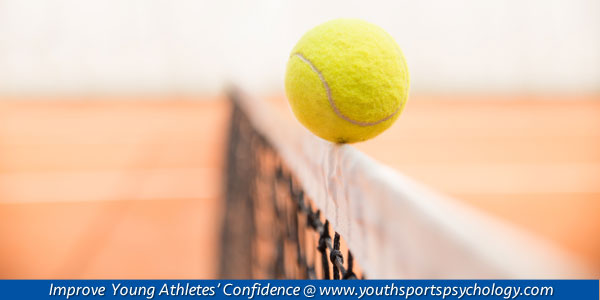
Tackling Fear of Failure And Perfectionism
If you and your sports kids are planning your New Year’s resolutions, we’ve got a good one for you:
Try tackling the biggest mental game challenges most sports kids face.
As we’ve mentioned before, fear of failure and perfectionism are the top challenges for sports kids and their parents. Nearly every athlete grapples with these issues.
When kids are afraid of failure, they strive to avoid making mistakes. This is a huge mental game no-no. When sports kids focus on not making mistakes, they play it safe. They play tentatively, they’re stiff and avoid taking risks.
When they do this, they don’t perform well. In fact, they often make more mistakes, and then get frustrated with themselves and play even worse.
Instead, you want your sports kids to play intuitively, confidently and creatively. You want them to try out new techniques and take risks. This is how they’ll grow as athletes.
As for perfectionism, you’ve probably seen some of its symptoms.
Kids who are perfectionists also don’t like making mistakes.
- They want to be “perfect” all the time.
- They’re very hard on themselves.
- They play tentatively at times, and avoid taking risks.
- They often think, “If I really go for it, I might blow it and look really bad.
On the other hand, perfectionists work really hard in practice. And they’re not perfectionists 24 hours a day.
Often, they’re perfectionists if they’re feeling less confident, if they’ve made a mistake, or if they’re worried about what others are thinking about them.
To help kids overcome these challenges, it’s important to tell them it’s okay to make mistakes. In fact, you want to encourage them to take risks, and remind them that’s the only way they’re going to grow.
As we like to say, if you don’t fall down when you’re learning to ice skate, you’re never going to get better!
Help sports kids understand why they’re perfectionists.
What has led them to believe they must be perfect all the time?
Often, perfectionists get Straight As in school and have some experience being great players. They have reputations for doing well, and have been praised for their accomplishments. It’s hard for them to risk that reputation.
Related Articles on Kids’ Mental Game:
- Helping Young Athletes Kick Perfectionism and Fear of Failure
- Motivates Kids to Play Sports and Stay Active
- How Athletes Can Move on after a Bad Game or Failure
*Subscribe to The Sports Psychology Podcast on iTunes
*Subscribe to The Sports Psychology Podcast on Spotify
The Composed Sports Kid

“The Composed Sports Kid” audio and workbook digital download program for young athletes and their parents or coach helps kids cope with frustration and anger in sports. Help your sports kids learn how to manage expectations and let go of mistakes so they can keep their head in the game.
The Composed Sports Kid system is really two programs in one–one program to train parents and coaches how to help their kids practice composure, and one program that teaches young athletes–ages 6 to 13–how to improve composure, let go of mistakes quickly, have more self-acceptance, and thus enjoy sports more!
